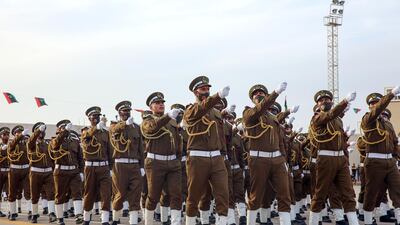As the UN edges towards sending monitors to ensure Libya's ceasefire deal holds, experts fear pressures from the country's warring sides could derail a useful mission.
The UN mission to Libya laid out plans this month to send “a limited number of impartial, unarmed, non-uniformed international monitors” after weeks of closed-door talks at the Security Council in New York.
Experts on Libya told The National that foreign observers would struggle to gain access to front lines, obtain the gear they need and may even endure online smear campaigns.
But an effective mission could improve security in the turbulent oil-exporting nation, they said.
“The UN has long been involved in Libya but this would be the first time it plays an active, physical role in conflict resolution and monitoring on the ground,” said Jon Hancock, director of logistics company Libya Consultancy.
“There will be challenges but it’s a huge shift that could expand and yield gains in conjunction with the current peace process. The positives immensely outweigh any negatives.”
Libya sank into chaos after a 2011 Nato-backed uprising ousted autocrat Muammar Qaddafi and split the country between a government in the capital Tripoli and a rival authority in the east.
The planned UN monitors will track compliance with an October ceasefire deal that called for the withdrawal of all armed forces from conflict areas and the departure of about 20,000 foreign fighters within three months.
The team would be sent to Sirte, a gateway to ports and oilfields and a front line between forces of Tripoli’s Government of National Accord in Tripoli and Field Marshal Khalifa Haftar’s Libyan National Army.
If successful, the mission could be extended.
UN Secretary General Antonio Guterres proposed in his latest report a "nimble and scalable team" to monitor troop withdrawals, posting police and clearing of mines, booby traps and unexploded bombs.
They would work alongside GNA and LNA teams already observing the ceasefire.
It remains unclear whether Libya’s main forces will co-operate with monitors, as both sides object to blue helmets or other foreign forces on Libyan soil, the UN says.
The UN has asked members for money and personnel, and for the African Union, EU and Arab League to offer support.
The Security Council may pass a resolution on the monitors this month.
Wolfgang Pusztai, chairman of an advisory board at the National Council on US-Libya Relations, said the mission would only achieve results if monitors had freedom of movement and came equipped with the latest surveillance gear.
“If they had access to tactical surveillance equipment, perhaps provided by European nations, radar from the ships for airspace surveillance, drones, signal intelligence, they could provide an objective picture of the situation on the ground,” Mr Pusztai said.
“If they have freedom of movement, this would certainly help get objective reporting and this could elevate the threshold for a real renewed outbreak of hostilities.”
The monitors could provide world powers with an accurate account of Libya's chaotic conflict, but in no way could they deter an offensive by a determined force, he said.
Mr Hancock said that monitors could quickly be sucked into the “propaganda and disinformation” campaigns on social media in Libya, often backed by foreign powers.
Reports from Stanford University and the Africa Centre for Security Studies say Twitter and Facebook have been hijacked by accounts pushing bogus, slanted and misleading accounts of the conflict to Libyan users.
“Disinformation will be one of the biggest headaches for UN monitors who will doubtless have false and negative information whipped up about them on social media, which could make it harder for them to do their jobs,” Mr Hancock said.
But he said a “key benefit of UN monitors is that they will see what’s actually happening on the ground and report back reliable intelligence to counter this disinformation".


